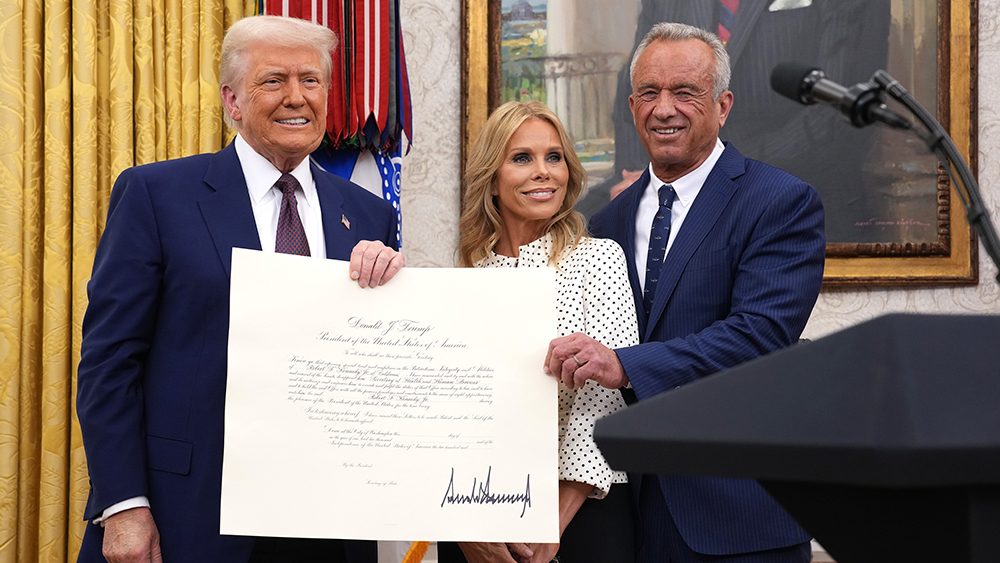 Parler
Parler Gab
Gab
- Glyphosate (Roundup), the world’s most widely used herbicide, is linked to non-Hodgkin lymphoma and is manufactured by Bayer/Monsanto. Banned or restricted in Austria (attempted), Germany (phase-out replaced by restrictions), Luxembourg, France (partial bans), Qatar, Bahrain, Kuwait, Oman, Saudi Arabia, UAE and St. Vincent and the Grenadines. Widely used with genetically modified organism (GMO) crops engineered for glyphosate resistance, including soy, corn, cotton, canola, sugar beets and alfalfa. Annual U.S. usage: 280-290 million pounds.
- Paraquat, a highly toxic herbicide linked to Parkinson’s disease, sold by Syngenta (a Chinese state-owned company). Banned in over 70 countries, including the EU, China (domestic use), Brazil, Chile, Malaysia, Peru, Taiwan, Thailand and the U.K. Often used in weed control rotations. Annual U.S. usage: 8 million pounds.
- PFAS, a class of over 12,000 compounds used in firefighting foams, non-stick coatings and industrial processes, are linked to cancer, thyroid disease, immune system suppression and birth defects. Subject to a proposed EU-wide ban; already banned or restricted in France (consumer products by 2026, textiles by 2030), Denmark (food packaging) and New Zealand (cosmetics by 2026). Used in agricultural seed coatings, irrigation systems, chemical containers and food packaging, contaminating soil, water, food and consumers.
- Neonicotinoids, insecticides that kill pollinators and are associated with neurological harm in humans. Banned or restricted in the EU (outdoor use of three neonicotinoids since 2018), France (all outdoor use) and Slovenia. Used as seed coatings on both GMO and non-GMO crops, especially corn and soybeans. Annual U.S. usage: 4 million pounds.
- Dicamba, a herbicide known for widespread crop damage and environmental contamination. Banned in the U.S. for over-the-top applications on soybeans and cotton (2024 federal court decision); classified as “very dangerous” in Brazil but still permitted. Used with GMO dicamba-resistant crops such as Xtend soybeans and cotton. Annual U.S. usage: 9 million pounds.
- Atrazine, an endocrine-disrupting herbicide linked to birth defects, reproductive harm and amphibian population collapse. Banned in the EU (since 2004) and in Austria, Bahrain, Denmark, France, Germany, Italy and Sweden; also banned in Hawaii and U.S. territories. Heavily used in conventional corn, which is tolerant through selective breeding. Annual U.S. usage: 70 million pounds.
 Chart source (and spelling): FarmdocDaily.
The House Agriculture Committee’s draft farm bill proposes cutting $290 billion from SNAP over the next decade, with $60 billion of those funds diverted to increase subsidies for farm programs that benefit the industrial commodity system: Corn, soy, cotton and the chemical giants and GMO companies that profit from it.
At the same time, the administration has cut $754 million from the Natural Resources Conservation Service (NRCS), the very program that provides essential technical assistance and cost-sharing to farmers working to improve on-farm resilience, increase soil health, reduce erosion and protect water quality.
NRCS is the front line for farmers seeking to reduce chemical inputs and build long-term resilience, yet its funding has been slashed.
This is a policy direction that prioritizes corporate profit over public health, while stripping low-income families of the means to access the very food they need to survive.
This is the antithesis of the MAHA movement.
The scale of this betrayal is staggering.
The real cost of corporate control: Subsidies, greenwashing and a war on life
The National Organic Program, which safeguards organic standards and ensures consumer trust, operates on a modest $23.2 million annual budget.
In stark contrast, chemical-intensive industrial agriculture is a monster created by the government.
The U.S. Department of Agriculture has recently funneled over $10 billion in direct payments to commodity agriculture through the Emergency Commodity Assistance Program alone, supporting industrial monocultures like genetically engineered corn, soy and cotton that depend on heavy pesticide and fertilizer use.
These funds overwhelmingly benefit the chemical giants and GMO seed companies driving the industrial agricultural system, and further line the coffers of political supporters.
No wonder there is a battle. This has nothing to do with feeding America healthy food, and everything to do with profit at all cost!
The business model relies on government subsidies and crop insurance payments. Its approach weakens the resilience of the farm system, and gives handouts which ensure that the American people are forced to eat the products that have become the basis of obesity and disease.
Now add liability shields into the mix, and we are truly on the path to environmental and human health collapse.
This would be a perfect time for the government to stop being an ATM from which chemical giants and industrial agricultural interests extract billions of taxpayer dollars, and to reverse the system that poisons people, destroys soil and undermines health.
Outsized government funding has created the agrochemical sector and incentivized farmers to adopt life-damaging practices, which have destroyed soil, created a treadmill for chemical warfare with nature and put chemical-laden products into the food supply.
If there are tens of billions of dollars available to prop up and advance a dangerous suite of practices, there are billions of dollars that could be redirected to transition it.
These current giveaways to big corporations are on top of the existing $181.8 billion in projected subsidies for programs like Agricultural Risk Coverage, Price Loss Coverage and crop insurance over the next decade.
Corn alone has received $47.5 billion in premium subsidies since 1995, soy $28.1 billion, wheat $17.3 billion, and cotton $12.4 billion — crops at the heart of the chemical-intensive, GMO-dominated model.
If we want a clean, healthy food supply, organic agriculture is the only real and viable option. Yet the public is being misled by a deliberate shift in language, using the term regenerative in place of organic as a cover for the chemical industry’s agenda.
Chemical-intensive practices, like chemically burning down cover crops with herbicides, are being falsely framed as soil health measures. This smoke-and-mirrors messaging is deeply damaging, and many within the MAHA and regenerative agriculture movement do not fully grasp the nuance.
The MAHA movement must stand: Strengthen organic, redirect subsidies to aid transition, defeat chemical liability shields, defeat the EATS Act
Organic standards have been steadily weakened, consistently under previous administrations, and now more frontally under this one.
The National Organic Program, which sets enforceable standards and ensures consumer trust, has faced severe funding freezes, halting key initiatives like the Organic Market Development Grant Program and the Transition to Organic Partnership Program.
The administration has also canceled numerous Climate-Smart Commodity Projects, initiatives designed to help farmers transition to regenerative practices that improve soil health, reduce chemical dependency and cut greenhouse gas emissions.
An executive order even froze over $2 billion in conservation payments owed to more than 30,000 farmers, breaking trust with those who had stepped up in good faith to adopt conservation practices.
These actions are not isolated budget decisions. They represent a systematic dismantling of the very pathways farmers and families need to build a food system that nourishes people and the land.
They send a clear message: while the administration claims to support regenerative and organic agriculture, its policies tell the real story — billions for industrial agribusiness, and budget cuts for those working to heal the land.
This is not an accident. This is a deliberate choice. The funneling of billions for industrial chemical agriculture, while meagre organic initiatives are frozen.
If we want a food system that nourishes people and the land, we need to stop pretending we can reform the chemical model. The administration’s policies have made clear that their priority is propping up industrial agribusiness, not supporting a regenerative future. We must wake up to this reality.
A whole new, largely right-leaning and independent constituency was awakened to the mission of MAHA and on the basis of election promises, mobilized to help elect Trump.
Yet, while MAHA messaging grows stronger, those battle-hardened warriors who laid the foundations for structural reforms supporting regenerative organic transitions are, for the most part, not invited to the table.
Last week, the MAHA Commission, chaired by U.S. Secretary of Health and Human Services (HHS) Robert F. Kennedy Jr., released a report reaffirming its commitment to protecting public health and reducing toxic exposures.
However, as Kennedy works to advance these values, the rest of the administration is pushing a pro-chemical, pro-corporate agenda.
The broader administration is codifying policies that stand in direct opposition to the MAHA Commission’s mission, handing over billions of dollars to the chemical ag industry and implementing actions that are destroying the very foundations of organic and regenerative transition.
MAHA leadership and the broader MAHA electorate who delivered votes to the Trump team must step away from the White House glamour and stand in the clarity of why they voted for MAHA in the first place and hold the Administration accountable for its election promises.
The MAHA movement was never about political loyalty. It was built to restore health, protect life and break free from corporate control. The future of MAHA depends on its ability to stay focused, stay independent and demand results, not rhetoric.
I am no partisan, but this reality raises a crucial question: Why are Republican congressional leaders, who claim to stand for American farmers, families and sovereignty, so intent on shielding foreign-owned corporations like Germany’s Bayer (Monsanto) and China’s Syngenta from chemical liability, and China’s Smithfield (the largest pork producer in the U.S.) and Brazil’s JBS S.A (the world’s largest meat processor) with new versions of the EATS Act, when their products and practices harm our people, our land and our future?
This is not just a question of politics. It is a question of principle. When we have an opportunity to help farmers increase their soil health, understand the science of organic, biological agriculture and wean their land off the expensive chemical drugs that have trapped them in an endless cycle of poison and chemical warfare with nature, why are we not doing the fiscally responsible thing?
Farmers may worry about losing tools in their toolkit, but the administration’s job is to help them retool, supporting a transition to practices that build natural capital, reduce input costs and make farm businesses more resilient.
Subsidies should no longer prop up Big Chemical and Big GMO seed. They should support a wholesome, resilient transition toward regenerative organic agriculture.
A whole new constituency has awakened to the determined mission of MAHA — mothers, farmers, veterans, healers and families who understand that we cannot trade health for convenience, or sovereignty for corporate profit.
Yet, while the MAHA movement grows stronger, the administration advances policies that destroy the very foundations of organic and regenerative transition.
It is time for MAHA and its allies to get serious about defeating chemical liability shields and beating back the so-called EATS Act and its successor legislation.
Both the EATS Act and chemical liability shields remove legal accountability from powerful agribusinesses and chemical giants; strip rights from individuals, farmers and communities, and prevent states from acting to protect health, animals and the environment.
The fight over pesticide liability shields is not a side issue, it is THE food safety and public health issue. Without taking down these shields, any real transition to regenerative, life-affirming agriculture is impossible.
The MAHA movement was born out of the devastation wrought by vaccine liability shields. Pesticide liability shields are of the same paradigm. The political base that already understands this dynamic is primed and ready. This is a moment of opportunity to build a large consensus on health and food safety.
Unfortunately, the current administration is actively working to undermine MAHA’s goals while it makes public statements of support.
Transition funding is being stripped or quietly redirected. NRCS has been hollowed out. The National Organic Program is barely functioning. Policy is increasingly being dictated by industrial agriculture and chemical lobbyists.
This is not theoretical. We need people who understand policy and power to lead a transformation of our politics alongside those who have hands-on experience shifting large-scale operations from chemical to biological agriculture.
I have worked directly with large-scale industry on scalable approaches to transitions from chemical to biological agriculture.
We can reduce chemical inputs dramatically, restore ecological resilience and rebuild soil health using nature-based, life-supporting practices.
There are ways to grow food without destroying health and life. Agribusiness must learn them, and we must structure incentives accordingly — not to reward warfare against nature, but to foster regeneration, stewardship and ecological sanity.
We are fighting on the side of nature, the essence of life itself. That is where the majority of Americans stand, notwithstanding the policy specifics.
Stop the shield legislation. Restore the right of the people to hold powerful corporations accountable and to set higher standards for the health of families, animals, the land and our communities.
Read more at: KucinichReport.Substack.com
Chart source (and spelling): FarmdocDaily.
The House Agriculture Committee’s draft farm bill proposes cutting $290 billion from SNAP over the next decade, with $60 billion of those funds diverted to increase subsidies for farm programs that benefit the industrial commodity system: Corn, soy, cotton and the chemical giants and GMO companies that profit from it.
At the same time, the administration has cut $754 million from the Natural Resources Conservation Service (NRCS), the very program that provides essential technical assistance and cost-sharing to farmers working to improve on-farm resilience, increase soil health, reduce erosion and protect water quality.
NRCS is the front line for farmers seeking to reduce chemical inputs and build long-term resilience, yet its funding has been slashed.
This is a policy direction that prioritizes corporate profit over public health, while stripping low-income families of the means to access the very food they need to survive.
This is the antithesis of the MAHA movement.
The scale of this betrayal is staggering.
The real cost of corporate control: Subsidies, greenwashing and a war on life
The National Organic Program, which safeguards organic standards and ensures consumer trust, operates on a modest $23.2 million annual budget.
In stark contrast, chemical-intensive industrial agriculture is a monster created by the government.
The U.S. Department of Agriculture has recently funneled over $10 billion in direct payments to commodity agriculture through the Emergency Commodity Assistance Program alone, supporting industrial monocultures like genetically engineered corn, soy and cotton that depend on heavy pesticide and fertilizer use.
These funds overwhelmingly benefit the chemical giants and GMO seed companies driving the industrial agricultural system, and further line the coffers of political supporters.
No wonder there is a battle. This has nothing to do with feeding America healthy food, and everything to do with profit at all cost!
The business model relies on government subsidies and crop insurance payments. Its approach weakens the resilience of the farm system, and gives handouts which ensure that the American people are forced to eat the products that have become the basis of obesity and disease.
Now add liability shields into the mix, and we are truly on the path to environmental and human health collapse.
This would be a perfect time for the government to stop being an ATM from which chemical giants and industrial agricultural interests extract billions of taxpayer dollars, and to reverse the system that poisons people, destroys soil and undermines health.
Outsized government funding has created the agrochemical sector and incentivized farmers to adopt life-damaging practices, which have destroyed soil, created a treadmill for chemical warfare with nature and put chemical-laden products into the food supply.
If there are tens of billions of dollars available to prop up and advance a dangerous suite of practices, there are billions of dollars that could be redirected to transition it.
These current giveaways to big corporations are on top of the existing $181.8 billion in projected subsidies for programs like Agricultural Risk Coverage, Price Loss Coverage and crop insurance over the next decade.
Corn alone has received $47.5 billion in premium subsidies since 1995, soy $28.1 billion, wheat $17.3 billion, and cotton $12.4 billion — crops at the heart of the chemical-intensive, GMO-dominated model.
If we want a clean, healthy food supply, organic agriculture is the only real and viable option. Yet the public is being misled by a deliberate shift in language, using the term regenerative in place of organic as a cover for the chemical industry’s agenda.
Chemical-intensive practices, like chemically burning down cover crops with herbicides, are being falsely framed as soil health measures. This smoke-and-mirrors messaging is deeply damaging, and many within the MAHA and regenerative agriculture movement do not fully grasp the nuance.
The MAHA movement must stand: Strengthen organic, redirect subsidies to aid transition, defeat chemical liability shields, defeat the EATS Act
Organic standards have been steadily weakened, consistently under previous administrations, and now more frontally under this one.
The National Organic Program, which sets enforceable standards and ensures consumer trust, has faced severe funding freezes, halting key initiatives like the Organic Market Development Grant Program and the Transition to Organic Partnership Program.
The administration has also canceled numerous Climate-Smart Commodity Projects, initiatives designed to help farmers transition to regenerative practices that improve soil health, reduce chemical dependency and cut greenhouse gas emissions.
An executive order even froze over $2 billion in conservation payments owed to more than 30,000 farmers, breaking trust with those who had stepped up in good faith to adopt conservation practices.
These actions are not isolated budget decisions. They represent a systematic dismantling of the very pathways farmers and families need to build a food system that nourishes people and the land.
They send a clear message: while the administration claims to support regenerative and organic agriculture, its policies tell the real story — billions for industrial agribusiness, and budget cuts for those working to heal the land.
This is not an accident. This is a deliberate choice. The funneling of billions for industrial chemical agriculture, while meagre organic initiatives are frozen.
If we want a food system that nourishes people and the land, we need to stop pretending we can reform the chemical model. The administration’s policies have made clear that their priority is propping up industrial agribusiness, not supporting a regenerative future. We must wake up to this reality.
A whole new, largely right-leaning and independent constituency was awakened to the mission of MAHA and on the basis of election promises, mobilized to help elect Trump.
Yet, while MAHA messaging grows stronger, those battle-hardened warriors who laid the foundations for structural reforms supporting regenerative organic transitions are, for the most part, not invited to the table.
Last week, the MAHA Commission, chaired by U.S. Secretary of Health and Human Services (HHS) Robert F. Kennedy Jr., released a report reaffirming its commitment to protecting public health and reducing toxic exposures.
However, as Kennedy works to advance these values, the rest of the administration is pushing a pro-chemical, pro-corporate agenda.
The broader administration is codifying policies that stand in direct opposition to the MAHA Commission’s mission, handing over billions of dollars to the chemical ag industry and implementing actions that are destroying the very foundations of organic and regenerative transition.
MAHA leadership and the broader MAHA electorate who delivered votes to the Trump team must step away from the White House glamour and stand in the clarity of why they voted for MAHA in the first place and hold the Administration accountable for its election promises.
The MAHA movement was never about political loyalty. It was built to restore health, protect life and break free from corporate control. The future of MAHA depends on its ability to stay focused, stay independent and demand results, not rhetoric.
I am no partisan, but this reality raises a crucial question: Why are Republican congressional leaders, who claim to stand for American farmers, families and sovereignty, so intent on shielding foreign-owned corporations like Germany’s Bayer (Monsanto) and China’s Syngenta from chemical liability, and China’s Smithfield (the largest pork producer in the U.S.) and Brazil’s JBS S.A (the world’s largest meat processor) with new versions of the EATS Act, when their products and practices harm our people, our land and our future?
This is not just a question of politics. It is a question of principle. When we have an opportunity to help farmers increase their soil health, understand the science of organic, biological agriculture and wean their land off the expensive chemical drugs that have trapped them in an endless cycle of poison and chemical warfare with nature, why are we not doing the fiscally responsible thing?
Farmers may worry about losing tools in their toolkit, but the administration’s job is to help them retool, supporting a transition to practices that build natural capital, reduce input costs and make farm businesses more resilient.
Subsidies should no longer prop up Big Chemical and Big GMO seed. They should support a wholesome, resilient transition toward regenerative organic agriculture.
A whole new constituency has awakened to the determined mission of MAHA — mothers, farmers, veterans, healers and families who understand that we cannot trade health for convenience, or sovereignty for corporate profit.
Yet, while the MAHA movement grows stronger, the administration advances policies that destroy the very foundations of organic and regenerative transition.
It is time for MAHA and its allies to get serious about defeating chemical liability shields and beating back the so-called EATS Act and its successor legislation.
Both the EATS Act and chemical liability shields remove legal accountability from powerful agribusinesses and chemical giants; strip rights from individuals, farmers and communities, and prevent states from acting to protect health, animals and the environment.
The fight over pesticide liability shields is not a side issue, it is THE food safety and public health issue. Without taking down these shields, any real transition to regenerative, life-affirming agriculture is impossible.
The MAHA movement was born out of the devastation wrought by vaccine liability shields. Pesticide liability shields are of the same paradigm. The political base that already understands this dynamic is primed and ready. This is a moment of opportunity to build a large consensus on health and food safety.
Unfortunately, the current administration is actively working to undermine MAHA’s goals while it makes public statements of support.
Transition funding is being stripped or quietly redirected. NRCS has been hollowed out. The National Organic Program is barely functioning. Policy is increasingly being dictated by industrial agriculture and chemical lobbyists.
This is not theoretical. We need people who understand policy and power to lead a transformation of our politics alongside those who have hands-on experience shifting large-scale operations from chemical to biological agriculture.
I have worked directly with large-scale industry on scalable approaches to transitions from chemical to biological agriculture.
We can reduce chemical inputs dramatically, restore ecological resilience and rebuild soil health using nature-based, life-supporting practices.
There are ways to grow food without destroying health and life. Agribusiness must learn them, and we must structure incentives accordingly — not to reward warfare against nature, but to foster regeneration, stewardship and ecological sanity.
We are fighting on the side of nature, the essence of life itself. That is where the majority of Americans stand, notwithstanding the policy specifics.
Stop the shield legislation. Restore the right of the people to hold powerful corporations accountable and to set higher standards for the health of families, animals, the land and our communities.
Read more at: KucinichReport.Substack.com
Anti-ICE propaganda being spread by coordinated influencers
By News Editors // Share
LA riots just the start: Left-wing radicals push for southwest secession
By Finn Heartley // Share
MAGA influencer calls to deploy Palantir on LA streets
By News Editors // Share
And so it begins: Leftist monkey wrenching is leading to civil war
By News Editors // Share
Governments continue to obscure COVID-19 vaccine data amid rising concerns over excess deaths
By patricklewis // Share
Tech giant Microsoft backs EXTINCTION with its support of carbon capture programs
By ramontomeydw // Share
Germany to resume arms exports to Israel despite repeated ceasefire violations
By isabelle // Share










